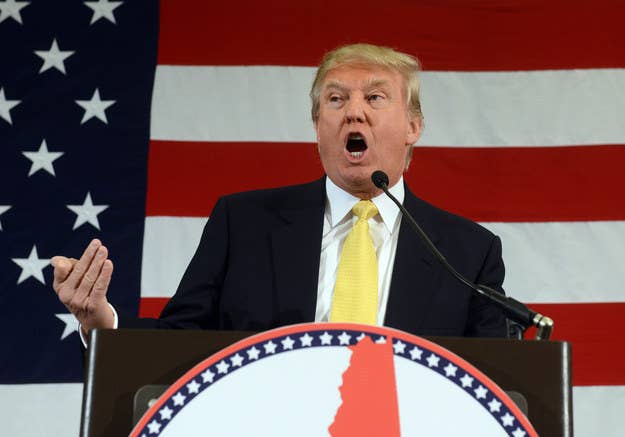
Real-estate mogul and now Republican presidential candidate Donald Trump briefly flirted with the idea of running for president in 2000 as a member of the Reform Party.
Trump, who launched his presidential campaign for the Republican nomination Tuesday, published an outline of his positions in a book titled, The America We Deserve.
Many of the positions Trump put forth in the book fall in line with what he stands for today. He opposed illegal immigration, supported capital punishment (and sometimes harsher sentences), supported school choice, wanted to fight terrorism, and he supported Israel.
On issues like abortion, gun rights, health care, and taxes, however, Trump's positions were far off from the current Republican line.
Trump on health care: "We need, as a nation, to reexamine the single-payer plan, as many individual states are doing."
What would universal care look like? Nebraska senator Kerrey and others have advocated a version of the Canadian-style, single-payer system in which all payments for medical care are made to a single agency (as opposed to the large number of HMOs and insurance companies, with their diverse rules, claim forms, and déductibles ).
A recent study done by the Massachusetts Medical Society says that in Massachusetts the single-payer plan would save $ 5 billion or about one-seventh of the overhead spent on medical care. Administrative costs across America make up 25 percent of the healthcare dollar, which is two-and-a-half times the cost of healthcare administration in Canada. Doctors might be paid less than they are now, as is the case in Canada, but they would be able to treat more patients because of the reduction in their paperwork.
The Canadian plan also helps Canadians live longer and healthier than Americans. There are fewer medical lawsuits, less loss of labor to sickness, and lower costs to companies paying for the medical care of their employees. If the program were in place in Massachusetts in 1999 it would have reduced administrative costs by $ 2.5 million. We need, as a nation, to reexamine the single-payer plan, as many individual states are doing. But implementing such a plan is not simple. One major problem is that the single-payer plan in Canada is in financial difficulty, as is the nationalized plan in the United Kingdom. We have to improve on the prototype.
On guns: "The Republicans walk the NRA line and refuse even limited restrictions. I generally oppose gun control, but I support the ban on assault weapons and I also support a slightly longer waiting period to purchase a gun."
It's often argued that the American murder rate is high because guns are more available here than in other countries. After a tragedy like the massacre at Columbine High School, anyone could feel that it is too easy for Americans to get their hands on weapons. But nobody has a good solution. This is another issue where you see the extremes of the two existing major parties. Democrats want to confiscate all guns, which is a dumb idea because only the law-abiding citizens would turn in their guns and the bad guys would be the only ones left armed. The Republicans walk the NRA line and refuse even limited restrictions. I generally oppose gun control, but I support the ban on assault weapons and I also support a slightly longer waiting period to purchase a gun. With today's Internet technology we should be able to tell within seventy-two hours if a potential gun owner has a record.
On abortion: "I support a woman’s right to choose, for example, but I am uncomfortable with the procedures."
There are some issues I don't want to say much about. I support a woman's right to choose, for example, but I am uncomfortable with the procedures. When Tim Russert asked me on Meet the Press if I would ban partial-birth abortion if I were president, my pro-choice instincts led me to say no. After the show, I consulted two doctors I respect and, upon learning more about this procedure, I have concluded that I would indeed support a ban.
On taxes, Trump supported a "one-time 14.25 percent tax on individuals and trusts with a net worth over $ 10 million."
I would impose a one-time, 14.25 percent tax on individuals and trusts with a net worth over $ 10 million. For individuals, net worth would be calculated minus the value of their principal residence. That would raise $ 5.7 trillion in new revenue, which we would use to pay off the entire national debt. We would save $ 200 billion in interest payments, which would allow us to cut taxes on middle-class working families by $ 100 billion a year or $ 1 trillion over ten years. We could use the rest of this savings—$ 100 billion—to bolster the Social Security Trust Fund. By 2030, when the Social Security fund is expected to go broke, we could put $ 3 trillion into the trust fund. This would make it solvent through the next century.
